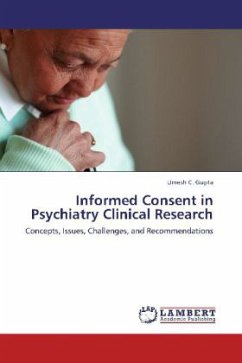Obtaining informed consent from mentally challenged patients in psychiatry clinical research has always been a challenge for researchers posing many ethical concerns and procedural hurdles due to participants impaired ability to judge the reality. Researchers, ethicists, and policy makers are struggling towards developing and implementing appropriate strategies and approaches optimizing the informed consent procedure in psychiatry clinical research to find a balance between risk-benefit ratio, research advancement, and autonomy of the study subjects. This book critically reviews the various ethical issues and challenges associated with informed consent, their underlying reasons, and investigate the appropriate strategies and practices needed to be adopted while obtaining informed consent from subjects with impaired consent capacity, participating in psychiatry clinical research.
Bitte wählen Sie Ihr Anliegen aus.
Rechnungen
Retourenschein anfordern
Bestellstatus
Storno








